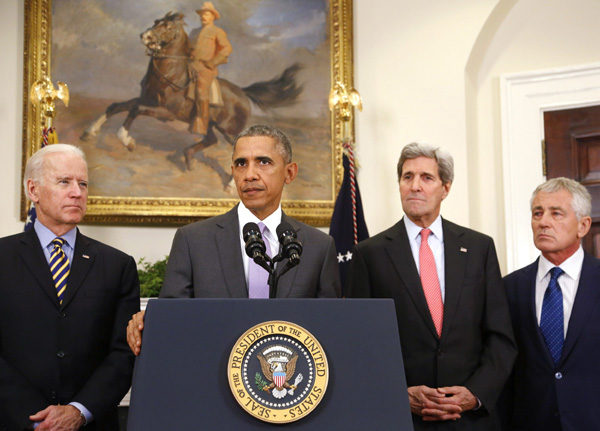 |
|
US President Barack Obama is flanked by Vice President Joe Biden (L), Secretary of State John Kerry (2nd R) and Defense Secretary Chuck Hagel (R) as he delivers a statement on legislation sent to Congress to authorize the use of military force against the Islamic State, from the Roosevelt Room at the White House in Washington February 11, 2015. [Photo/Agencies] |
The great Chinese master strategist Sun Tzu needs to be the United States' guide in dealing - or not dealing, when it is appropriate - with the Islamic State group, al-Qaida and other jihadi movements around the Middle East, not German strategist Carl von Clausewitz, the advocate of a direct knock-out approach to war.
British historian Andrew Roberts' magnificent work on President Franklin Roosevelt, US General George Marshall, British Prime Minister Winston Churchill and British General Sir Alan Brooke during World War II, Masters and Commanders, is extremely relevant here. Marshall and the American military, who had read Clausewitz, were clearly proponents of his straightforward "hit them on the head" style. But the British were Sun Tzu type stay-on-the periphery strategists. Indeed, until the great Field Marshal Bernard Montgomery came along in the fall of 1942 and gave them, integrated artillery and air power punch, the British Army only punched like a butterfly.
As Roberts makes clear, the US straightforward hit them with overwhelming power in the central axis of advance was exactly the right thing to do from 1944 onwards, when, as Churchill himself acknowledged, the Soviet Red Army had already knocked the stuffing out of the Wehrmacht. In 1942 and 1943, the US and Britain simply did not have remotely enough men and materials, and no command of the air, to invade France.
The true believers in a 1943 landing - Marshal, influential US staff war planner then-Lieutenant Colonel (later four star General) Albert Wedemeyer and others, (General Dwight D, Eisenhower was originally in agreement with them, but he learned from experience to change his original opinion) - would have presided over a catastrophe.

I’ve lived in China for quite a considerable time including my graduate school years, travelled and worked in a few cities and still choose my destination taking into consideration the density of smog or PM2.5 particulate matter in the region.